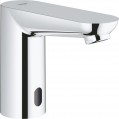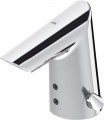Jet depth
Distance from the fixing point (for vertically mounted taps) or from the centre of the mounting hole (for horizontally mounted taps) to the middle of the spout. It is a characteristic that determines the "reach zone" of the tap.
Jet height
The jet height is usually specified for taps with horizontal installation (see "Type of installation"). It is measured from the base of the tap to the spout outlet. The large height of the spout is important primarily for kitchen models (see "Suitable for"), because it allows you to place large dishes in the sink. This parameter is directly related to the height of the spout (see above): the height of the jet cannot be greater than the height of the spout. Thus, in fact, one has to find a compromise between the height of the jet and the dimensions of the tap, especially if there is little space for its installation.
Water jet angle
The angle of the water jet produced by the tap, relative to the vertical. Generally stated for full head; with partially blocked water, this angle is smaller. Anyway, the water jet is usually directed towards the user, and the greater the angle of inclination, the farther from the spout the point of incidence of the jet will be placed. However, in most cases this point is not critical; problems can arise only in very cramped conditions, with small basin sizes.
Features
The functions of the tap are mainly design features, among which the are
check valve,
bottom valve,
cold start,
LED backlight,
temperature adjustment lever,
display,
auto-drain (hygienic flush),
washer/dishwasher switch< /a>, shelves for accessories. In more detail:
— Check valve. The non-return valve prevents the flow of water through the tap in the opposite direction — for example, when there is a large pressure difference between hot and cold water. This function will be relevant for those who are going to install water metres: the presence of check valves on mixers is often a prerequisite for fulfilling an application for installation, because such valves prevent counters from spinning in the opposite direction. In addition, you should pay attention to the presence of a check valve in the tap (especially a single-lever tap, see "Tap type"), if there are interruptions in the water supply of your house — such taps behave much better in case of pressure surges in the water supply.
— Drain valve. A device that allows you to close the drain hole in the sink, kitchen sink or bidet (depending on the purpose of the tap). There are two types:
— Lever drain valve.
...To control the operation of such a valve, a small lever is used, located behind the tap, on the side of it or in front of the body. Raising and lowering it opens and closes the drain plug in the sink.
— Pressing drain valve. Valves of this type are locked and unlocked by pressing the drain plug, for which you need to wet your hand.
— Cold start. A feature found exclusively in single-lever models. The general principle of operation of the “cold start” is as follows: if you open the tap with the initial position of the joystick, it will not bring out mixed warm water (as in more traditional single-lever devices), but only cold water. To add hot water and raise the temperature, you need to deflect the lever from its initial position. Such a format of work can provide significant savings: by default, cold water comes out of the tap, and hot water is added to it only if necessary.
— LED light. Lighting system based on LEDs — an efficient and economical source of illumination. The purpose and functionality of such a backlight may be different. So, in some models, it is installed on the spout and directed downwards, which allows you to clearly see the space under the spout even in low ambient light. Sometimes such illumination also illuminates the stream of water, giving it an unusual appearance. There are also quite original systems — for example, with a transparent spout and LEDs at its base, which creates the effect of a tap glowing from the inside; and in some models, the lighting also changes color depending on the temperature of the water. However, anyway, this feature significantly affects the cost, so it is typical mainly for premium products.
— Autodrain (hygienic flush). Such a system is equipped with taps with additional electronics — mostly contactless models, as well as products with a thermostat or a button switch. The autodrain works as follows: at a certain rate (for example, once every 12 hours or once a day), the automation briefly turns on the water. Due to this, harmful bacteria are washed out of the device, which tend to multiply on the inner surfaces of the spout and in “stagnant” water inside the tap itself. At the same time, the consumption of water for hygienic washing is small, usually it is practically not noticeable against the background of general consumption.
— Temperature adjustment lever. A function found in taps, which design initially does not imply a temperature controller — primarily non-contact models, as well as in products with one main lever or with button activation (see "Tap type"). As the name implies, the temperature control lever allows you to use such a tap not only to control the pressure, but also to change the temperature of the water.
– Display. Taps that display temperature and/or current water flow. The display provides a clear visualization of the settings and allows you to see what kind of water and how much is flowing from the tap. However, the presence of the screen significantly affects the cost of the tap.
— Washer/dishwasher switch. A function that can significantly facilitate the connection of a washing machine or dishwasher to the water supply system. Taps with a washer/dishwasher switch have a separate pipe for connecting the dishwasher, as well as the switch itself, which allows you to open and close the water supply to this pipe. Thus, to connect a washing machine or dishwasher, you do not need to install additional bushings, splitters, etc. — just connect the device to an existing output. And you can control the water supply directly from the tap body, for this you do not need to get under the sink or into another hard-to-reach place.
— Shelf for accessories. Most often, the role of such a shelf is played by the upper part of the body, specially made flat. This feature is found mainly in bath and/or shower taps (see “Suitable for”): it is convenient to keep shampoos, gels, soaps and other cosmetic/hygiene products on the shelf.
Note that this function is rare — mainly in high-end taps (in particular, thermostatic ones), which initially have large body sizes. In more traditional models, it makes no sense to include this design element — it is wiser to purchase a shelf as a separate accessory for the bathroom.Water flow
The maximum water flow during the operation of the tap, in other words, the maximum amount of water that it can pass through in a minute. This characteristic is important, foremost, for models designed for baths (see "Suitable for"): the greater the throughput, the faster the bath will fill. However, the meaning of this paragraph is not limited to this. First, flow information can be useful in certain calculations related to water supply — for example, to calculate the required pump capacity. Secondly, high-end taps can be equipped with aerators to achieve a powerful and efficient jet with low water consumption; the consumption indicated in the characteristics allows you to evaluate the efficiency of such devices in comparison with analogues.
Mixing unit
Unit for mixing hot and cold water in wall-mounted taps and sensor models. Concealed mixing units are installed primarily at the stage of construction or overhaul of housing. The tap's units are hidden in the installation box directly in the wall. The external
mixing unit usually has two openings for the supply of cold and hot water, a hose with mixed water which enters the tap. The outdoor control unit is equipped with a handle for adjusting the water temperature.
Tap height
The height of the tap, measured from its base or lowest point to the highest point of the spout. The height of the spout partly determines the installation possibilities — in fact, this is the minimum vertical free space that is required for the tap. In addition, in models with horizontal installation (see "Type of installation"), the spout height is related to the jet height (see below).
Country of brand origin
Country of origin of the brand under which the tap is marketed. Usually, it is indicated by the "homeland" of the manufacturing company or by the location of its headquarters. The brands under which modern mixers are produced come mainly from the following countries (in alphabetical order):
Austria,
Belgium,
Germany,
India,
Spain,
Italy,
China,
Poland,
Russia,
Turkey,
Czech Republic,
Finland,
France,
Sweden.
There are many stereotypes associated with the “nationality” of brands and products, but most of them have no basis nowadays. First, the actual place of production is often different from the brand's country of origin. Secondly, the quality of the goods depends not so much on geography, but on the policy of a particular company and how carefully this very quality is controlled in it. Therefore, you should pay attention to the country of origin of the brand only if you fundamentally want or (do not want) to support a manufacturer from a certain state. Quality is best judged by the reputation of a particular
...brand and the overall price category of the tap.Manufacturer's warranty
The warranty period claimed by the manufacturer for a certain tap model is the period during which the manufacturer guarantees the normal operation of the device. The specific terms of the warranty may vary, however, usually, it covers factory defects and malfunctions caused by the fault of the manufacturer or seller and discovered during normal use, without violating the rules; if such defects or malfunctions appear during the warranty period, the manufacturer undertakes the obligation to correct the situation at its own expense — up to replacing the tap with a working one.
Nowadays, you can find taps with a guarantee of
4 years,
5 years,
7 years,
10 years and even
25 years. In general, the longer the warranty period, the more reliable the product is, the higher its overall quality, ceteris paribus, but the more expensive it will cost compared to analogues.

